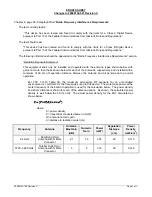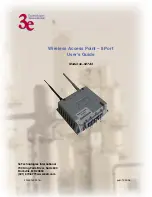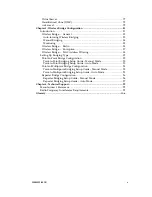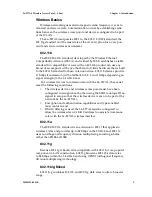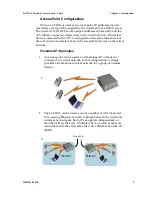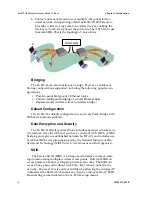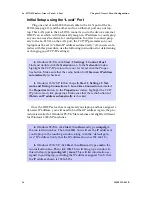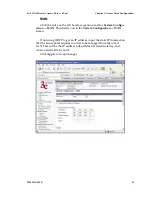
3e–527A3 Wireless Access Point – 8 Port
Chapter 1: Introduction
6
29000152-001 B
3e–527A3 Wireless Access Point – 8 Port
Chapter 1: Introduction
29000152-0001 B
7
3. The last and most prevalent use is multiple APs connected to a
wired network and operating off that network’s DHCP server to
provide a wider coverage area for wireless devices, enabling the
devices to “roam” freely about the entire site. The APs have to use
the same SSID. This is the topology of choice today.
����� ���
��
Bridging
The 3e–527A3 can also function as a bridge. There are a number of
briding configurations supported, including the following popular con-
figurations:
• Point-to-point bridging of 2 Ethernet Links;
• Point-to-multipoint bridging of several Ethernet links;
• Repeater mode (wireless client to wireless bridge.)
Default Configuration
The 3e–527A3's default configuration is an Access Point/Bridge with
FIPS 140-2 submode enabled.
Data Encryption and Security
The 3e–527A3 Wireless Access Point includes advanced wireless secu-
rity features. Over the AP band, you have a choice of AES, 3DES, or DKE.
Bridging encryption is established between 3e–527A3’s and includes use
of AES or 3DES encryption (approved by the National Institute of Stan-
dards and Technology (NIST) for U.S. Government and DoD agencies).
SSID
The Service Set ID (SSID) is a string used to define a common roam-
ing domain among multiple wireless access points. Different SSIDs on
access points can enable overlapping wireless networks. The SSID can
act as a basic password without which the client cannot connect to the
network. However, this is easily overridden by allowing the wireless AP
to broadcast the SSID, which means any client can discover the AP. SSID
broadcasting can be disabled in the 3e–527A3 setup menus.

